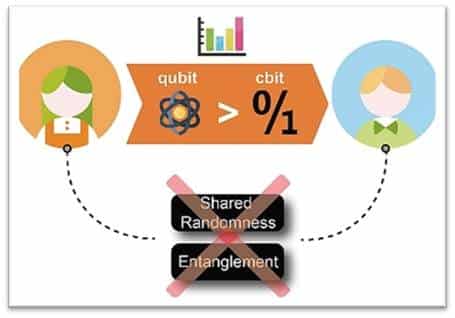Quantum Breakthrough: A New Era in Computing

Recent advancements in quantum computing have sparked excitement in the scientific community. A new study reveals that a simple quantum system can outperform classical systems in specific tasks. This breakthrough could reshape our understanding of quantum technology and its potential applications. Researchers have demonstrated that even a single qubit can achieve superior results compared to a classical bit, particularly in communication tasks that do not rely on shared resources. This finding opens the door to a future where quantum technologies may solve problems that classical computers cannot, even when resources are limited.
The Race for Quantum Supremacy
In the quest to develop the ultimate computer, quantum systems are often viewed as the future of technology. They promise to surpass classical computers in various ways, potentially revolutionizing industries from cryptography to artificial intelligence. However, proving this quantum advantage has proven challenging. Experiments in quantum computing are complex and fraught with difficulties. Researchers often encounter fundamental limitations that hinder progress. Despite these challenges, the recent study conducted by a team from the S. N. Bose National Center for Basic Sciences, in collaboration with several prestigious institutions, marks a significant milestone in this ongoing race.
The researchers focused on a fundamental aspect of quantum communication. They aimed to demonstrate that a single qubit could outperform a classical bit in a communication task without relying on additional resources, such as shared randomness. This is a crucial distinction, as classical communication typically depends on pre-agreed random numbers to function efficiently. The findings challenge long-held assumptions in the field and suggest that quantum systems may have inherent advantages that classical systems lack.
Breakthrough Experimentation
The groundbreaking study was led by Professor Manik Banik and his team at the S. N. Bose Centre. Their research was published in the journal Quantum and featured as an Editors’ Suggestion in Physical Review Letters. The team developed a photonic quantum processor and a novel tool called a variational triangular polarimeter. This device enabled them to measure light polarization with remarkable precision. They employed a technique known as Positive Operator-Valued Measurements (POVM), which is essential for understanding quantum systems’ behavior under realistic conditions, including the presence of noise.
The researchers’ results were striking. They demonstrated that, under identical conditions, a qubit could achieve superior performance compared to a classical bit. This finding not only validates the potential of quantum systems but also provides a compelling demonstration of quantum advantage in a real-world scenario. The implications of this research extend beyond theoretical discussions; they pave the way for practical applications of quantum technologies in communication and information processing.
Implications for the Future
The significance of this study goes beyond academic achievement. It represents a crucial step toward a future where quantum technologies could transform how we process and communicate information. As researchers continue to explore the capabilities of quantum systems, the gap between quantum and classical computing becomes increasingly intriguing. The potential applications of quantum technology are vast, ranging from secure communication to advanced computational methods that could solve complex problems in various fields.
As we move forward, the findings from this research will likely inspire further exploration and innovation in quantum computing. The ability of a single qubit to outperform classical bits in communication tasks suggests that quantum systems may hold the key to unlocking new possibilities in technology. This breakthrough not only enhances our understanding of quantum mechanics but also sets the stage for a future where quantum technologies play a central role in solving problems that classical computers struggle to address.
Observer Voice is the one stop site for National, International news, Sports, Editor’s Choice, Art/culture contents, Quotes and much more. We also cover historical contents. Historical contents includes World History, Indian History, and what happened today. The website also covers Entertainment across the India and World.

